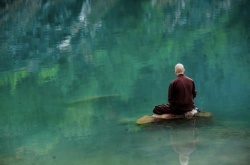Difference between revisions of "Dukkhadhammaa Sutta"
| Line 4: | Line 4: | ||
Maurice O'Connell Walshe}}<br/><br/> | Maurice O'Connell Walshe}}<br/><br/> | ||
| − | [1] "[[Monks]], when a [[monk]] [[knows]] as they really are both the [[arising]] and the destruction of states {{Wiki|productive}} of [[suffering]], then indeed the [[sense-pleasures]] are truly seen by him. When he sees the [[sense-pleasures]], the [[desire]] and [[love]] for [[sense-pleasures]], the infatuation and feverish longing for [[sense-pleasures]] that is [[inherent]] in them, all this does not obsess him. His [[life]] and practice[2] are so informed with [[wisdom]][3] that, living thus, he is not assailed by longing and {{Wiki|depression}},[4] which are [[evil]] and unskilled states. | + | [1] "[[Monks]], when a [[monk]] [[knows]] as they really are both the [[arising]] and the destruction of states {{Wiki|productive}} of [[suffering]], then indeed the [[sense-pleasures]] are truly seen by him. When he sees the [[sense-pleasures]], the [[desire]] and [[love]] for [[sense-pleasures]], the infatuation and feverish longing for [[sense-pleasures]] that is [[inherent]] in them, all this does not obsess him. His [[life]] and [[practice]][2] are so informed with [[wisdom]][3] that, living thus, he is not assailed by longing and {{Wiki|depression}},[4] which are [[evil]] and unskilled states. |
... | ... | ||
| − | "When, [[monks]], a [[monk]] [[lives]] and practices like this, it occasionally happens that, through a lapse of [[mindfulness]], [[evil]] and unskilled states arise, {{Wiki|memories}} and [[thoughts]][5] pertaining to the [[fetters]]. His [[mindfulness]] is aroused only slowly,[6] but then he soon abandons that state, drives it out, abolishes it, puts an end to it. Just as if, [[monks]], a man were to let fall two or three drops of [[water]] into an {{Wiki|iron}} pot that had been heated all day, those few drops would soon be wiped out and vanish in the same way it occasionally happens to a [[monk]] living and practicing like this... but he soon puts an end to it. | + | "When, [[monks]], a [[monk]] [[lives]] and practices like this, it occasionally happens that, through a lapse of [[mindfulness]], [[evil]] and unskilled states arise, {{Wiki|memories}} and [[thoughts]][5] pertaining to the [[fetters]]. His [[mindfulness]] is aroused only slowly,[6] but then he soon abandons that [[state]], drives it out, abolishes it, puts an end to it. Just as if, [[monks]], a man were to let fall two or three drops of [[water]] into an {{Wiki|iron}} pot that had been heated all day, those few drops would soon be wiped out and vanish in the same way it occasionally happens to a [[monk]] living and practicing like this... but he soon puts an end to it. |
| − | "Thus, [[monks]], if a [[monk's]] [[life]] and practice are so informed with [[wisdom]] that, living thus, he is not assailed by longing and {{Wiki|depression}}, which are [[evil]] states, then, [[monks]], if a king's ministers, friends, favorites, kinsmen or blood-relations should come and offer him [[wealth]], saying: 'Come, good [[master]]! Why let these yellow [[robes]] torment you? Why go around with shaven head and [[bowl]]? Come on, return to the lower [[life]], enjoy possessions and do works of [[merit]]!' [[monks]], for a [[monk]] so living and practicing to reject the training and revert to the lower [[life]] would just be impossible." | + | "Thus, [[monks]], if a [[monk's]] [[life]] and [[practice]] are so informed with [[wisdom]] that, living thus, he is not assailed by longing and {{Wiki|depression}}, which are [[evil]] states, then, [[monks]], if a king's ministers, friends, favorites, kinsmen or blood-relations should come and offer him [[wealth]], saying: 'Come, good [[master]]! Why let these yellow [[robes]] torment you? Why go around with shaven head and [[bowl]]? Come on, return to the lower [[life]], enjoy possessions and do works of [[merit]]!' [[monks]], for a [[monk]] so living and practicing to reject the {{Wiki|training}} and revert to the lower [[life]] would just be impossible." |
==Notes== | ==Notes== | ||
Latest revision as of 07:17, 9 March 2015
Dukkhadhammaa Sutta: Things Productive of Suffering (excerpt)
translated from the Pali by
Maurice O'Connell Walshe
[1] "Monks, when a monk knows as they really are both the arising and the destruction of states productive of suffering, then indeed the sense-pleasures are truly seen by him. When he sees the sense-pleasures, the desire and love for sense-pleasures, the infatuation and feverish longing for sense-pleasures that is inherent in them, all this does not obsess him. His life and practice[2] are so informed with wisdom[3] that, living thus, he is not assailed by longing and depression,[4] which are evil and unskilled states.
...
"When, monks, a monk lives and practices like this, it occasionally happens that, through a lapse of mindfulness, evil and unskilled states arise, memories and thoughts[5] pertaining to the fetters. His mindfulness is aroused only slowly,[6] but then he soon abandons that state, drives it out, abolishes it, puts an end to it. Just as if, monks, a man were to let fall two or three drops of water into an iron pot that had been heated all day, those few drops would soon be wiped out and vanish in the same way it occasionally happens to a monk living and practicing like this... but he soon puts an end to it.
"Thus, monks, if a monk's life and practice are so informed with wisdom that, living thus, he is not assailed by longing and depression, which are evil states, then, monks, if a king's ministers, friends, favorites, kinsmen or blood-relations should come and offer him wealth, saying: 'Come, good master! Why let these yellow robes torment you? Why go around with shaven head and bowl? Come on, return to the lower life, enjoy possessions and do works of merit!' monks, for a monk so living and practicing to reject the training and revert to the lower life would just be impossible."
Notes
1. Dukkhadhammaa. Woodward's "States of Ill" does not bring out the true meaning sufficiently.
2. Caaro ca vihaaro ca. Not as Woodward has it, "His path abroad and his lodging at home."
3. Anubuddha, past participle of anubodhati, makes good sense. Woodward conjectures anubuddha "followed," and translates "practiced."
4. Abhijjhaa domanassa: "coveting and dejection": Woodward. It is time to get away from the antiquated "coveting" for abhijjaa. Other and more suitable words exist.
5. Sara-sankappaa. Memory (sara) arises first, and then thoughts, plans, etc. (sankappaa) take over.
6. "At the third attempt he is certain to succeed" (SA [SN commentary]).

